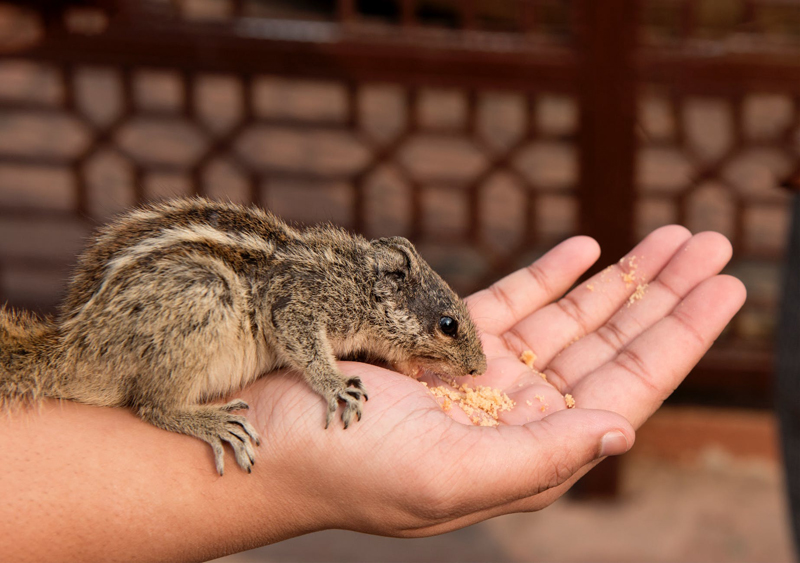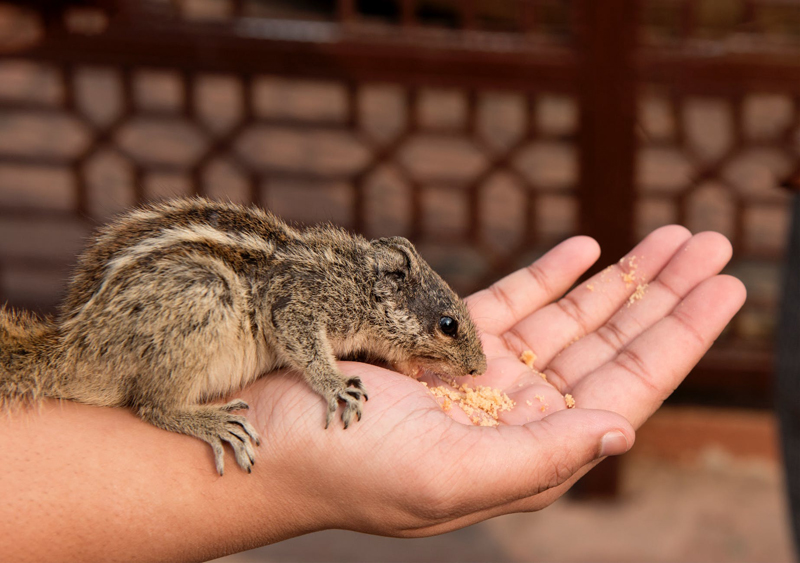Coatimundi - Pet Coatimundi

The coatimundi ranges over a wide variety of country, Central and South America. The White-Nosed Coatimundi ranges southwestern Arizona, southwestern Texas, and southwestern New Mexico. The white nosed Coatimundi is also in eastern Mexico and southern Mexico. The spelling variations of Coatimundi are coati mundi and coatimondi. The variation for white-nosed coatimundi is white-nosed coati.
As with many exotic animals often found in homes as an exotic pet the coatimundi is diminishing in numbers, for the exact same reasons animals that are now extinct or endangered, deforestation, poaching, and hunted for meat.
Be sure to purchase captive bred animals from a known breeder, or consider exotic pet adoption from a pet rescue. Pet rescue adoption can be highly fulfilling as well as helping an unwanted animal.
In the wild the coatimundi is an omnivore and eats primarily insects, fruit, nuts, green plant matter, birds, small reptiles, eggs, and nuts.
Having had raccoons I see a similarity between the personalities of the Coatimundi and the raccoon. There are few things cuter than 6-8 coatimundi’s running around with their tails at full staff chattering as they go.
Like the raccoon they are extremely intelligent and are just as good at unlatching, unlocking, unhooking, opening door knobs, or any other obstacle put in their way. They are the perpetual two-year old, certainly something to consider before purchasing a coatimundi. I personally would love to have eight raccoons and coatimundi’s living with me all the time but some of my sanity remains – thankfully.
The coati female is smaller than the male, sometimes considerably smaller, they can grow up to 18 pounds the average being between eight and eighteen pounds. They are about the size of a housecat, a large housecat, the average length between thirteen to twenty-seven inches.
They are both heat and cold sensitive and should not be exposed to either extreme temperature. They can be penned but the pen needs to be large. Inside personal space is preferable an extra bedroom perhaps. An inside pen with open door time is second best. An outside pen the coati must be protect from heat, needs shade and must have a safe heated environment in the winter. These are not northern critters.
Here is a coatimundi picture they are a very handsome critter.
|
More coati mundi pictures Coatimundi Pictures
The Coatimundi can also be very affectionate. They do make an outstanding exotic pet for the right people. The pet coatimundi is not quite as destructive as the pet raccoon but they are just as active and need and outlet for their pent up energy. They are just as apt to get into things just like the pet raccoon.
For some odd reason, people always ask me, is the ______ fill in the blank (mammal), more like a cat or dog? No exotic mammal is more like a cat or dog. If you must have a comparison; a coati is more like a gremlin.
Coati care
Make sure they have plenty of safe toys to play with. From an early age provide safe stuffed animals. (Find out what is inside stuff animals there is a gel killing pets). They do like to play rough and you need to discourage biting. Put a damper on the nipping and biting by substituting the stuffed animal quickly. Other toys are cat toys, dog toys, toys found in the baby department, toys found in the bird department, homemade toys, and toys that make cool noises even squeaky noises.
The coati can become very protective of their food, blankets, and toys. Don’t allow biting or disruptive behavior from the beginning, the older they get the more painful the bite will become and the harder it will be to discipline.
Don’t ever hit a coati. Use a spray bottle or gently grab its little nose, hold on to it and in a commanding voice say NO! If you are unkind to this little pet coati your animal will become mean.
The neutered or spay coati has little body odor. However, their excrement can smell pretty foul.
A bottle fed baby will make the most adjusted and affectionate pet. Be sure to spent a great deal of quality time with this baby and as it grows up so there is a firm bond. People laugh at me because I carry baby skunks, baby raccoons, and baby coatis with me all the time, when they are babies. They need a great deal of your attention, they are a social animal, – they need your love.
Wrap a soft baby blanket around yourself so that the blanket will acquire your scent. When you’re not holding your infant the scented blanket will help the coati to feel secure. Any soft and safe clothing item will do the trick as well.
They should have regular health checkups. Make sure you find a veterinarian before purchasing or adopting a Coatimundi. Make sure the veterinarian is familiar with the coatimundi. The Coatimundi should have vaccinations. These vaccinations are canine distemper, feline leucopenia, rabies. Only use killed-virus vaccines. Your coati will need to be wormed beginning at age 5-6 weeks.
Be sure to check with your veterinarian for the correct necessary vaccinations, how often, and the recommended deworm medicine. You will probably also have to deal with fleas. Check with your veterinarian for flea products that are safe for babies and for adult coatis. According to Dr. Cathy Cranmore of Tri-Lakes Exotics, Front Line brand Top Spot can be used on adult coatis just makes sure you put it high up on the neck so that the coati can't reach it. She also recommends Vet-Kem or Adams for young coatis. For youngsters she suggested spraying a towel and rubbing it on the animal.
A coatimundi should be spayed or neutered. Really it isn’t an option. Males can be very aggressive, females can become aggressive during heat cycles, and just downright obnoxious the rest of the time once they have hormones floating around.
It is a good idea to keep them on a natural diet as possible while some people feed pet food I don’t recommend cat food and only very high quality dog food, if at all! Then can enjoy monkey biscuits occasionally. Feed insects (home raised is best) fruit, veggies, root veggies, eggs, some cooked meat, and nuts.
They can have an occasional treat like a Fig Newton, perhaps a fruit loop; they do have a sweet tooth. Fresh fruit makes a far healthier treat. A household with a coati shouldn’t include a household with birds or reptiles. At least keep them safely separated. The coati is an opportunist eater and wouldn’t think twice about eating your lizard or parakeet.
Don’t feed chocolate, avocado, or caffeine or any plant that may be poisonous or toxic. Be sure to wash fruit and veggies. Make sure to keep potted plants from the coatimundi.
What goes in must come out. The coati can be litter box trained. Like the skunk or raccoon there may be a few oops here and there but that is the nature of the animal. Use kitty litter or torn up newspapers. I prefer the litter since it helps control the odor.
Look for Coatimundi for sale or exotic pet adoption
Love your coati but be firm especially when it comes to biting. Above all else, enjoy your pet coati.
***Raccoon roundworm
***Raccoons - How to Care for the Pet Raccoon
***Coatamundi - How to Care for the Pet Coatamundi
***Kinkajous - Pet Kinkajous
Subscribe free to the exotic pets newsletter. It is quick and easy Just glance to the right or scroll a bit to the bottom and subscribe. I will only bug you once a week :) Be the first to be in the know! Your information is always private!
I am also the Bird editor if you enjoy pet birds subscribe to the Birds newsletter. Birds BellaOnline
Amazon link you may find helpful
Raising And Caring For Your Pet Coatimundi
My book (paperback) FERRETS: A Complete Guide
Kindle Version of Ferrets: A Complete Guide
Ferrets: A Complete Guide
This site needs an editor - click to learn more!
You Should Also Read:
Exotic Pet Site Map
Ferrets - A Complete Guide Paperback and Kindle
Exotic Pet Shopping (the safest for your pets)
Related Articles
Editor's Picks Articles
Top Ten Articles
Previous Features
Site Map
Content copyright © 2023 by Diana Geiger. All rights reserved.
This content was written by Diana Geiger. If you wish to use this content in any manner, you need written permission. Contact
BellaOnline Administration
for details.








